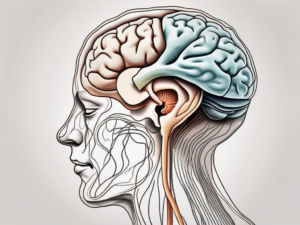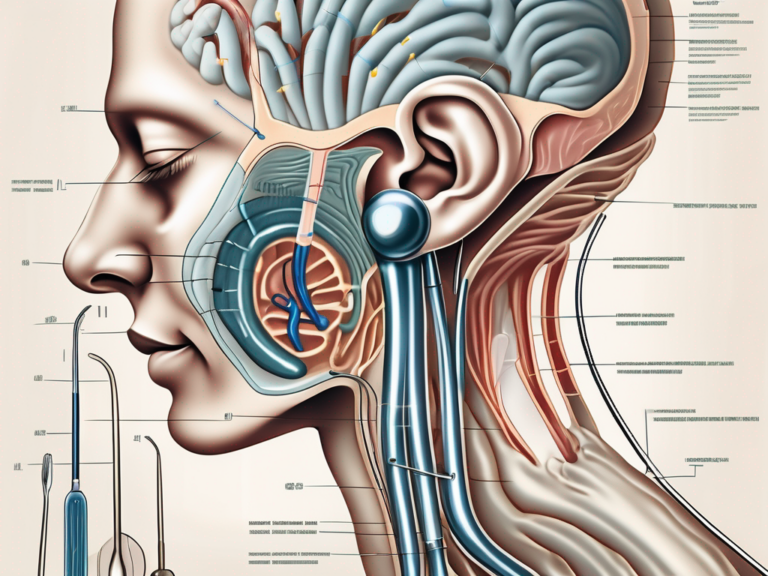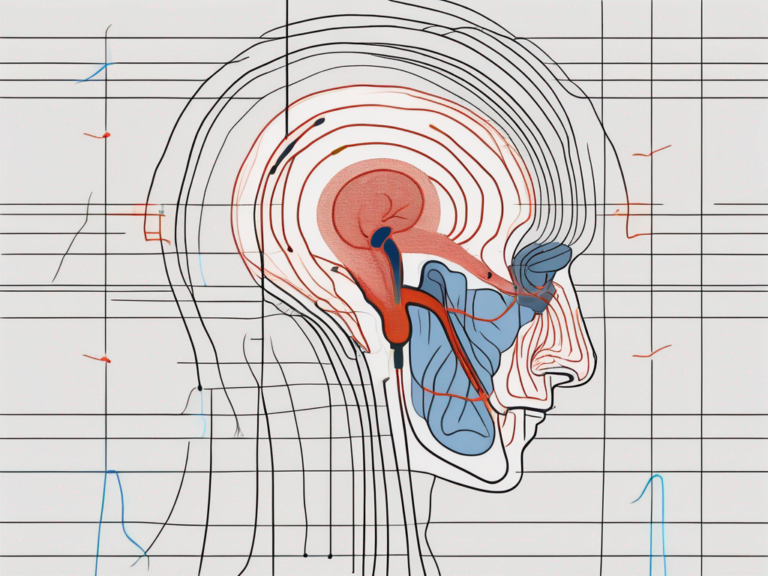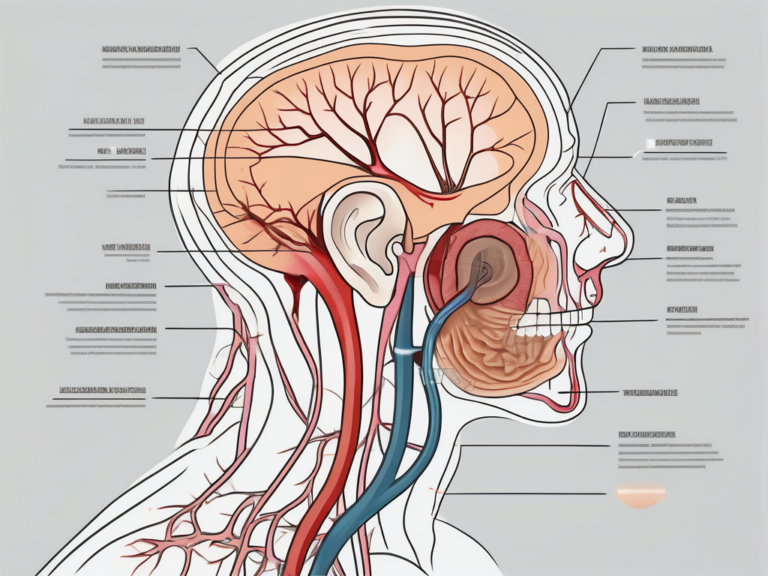The vestibular nerve is a crucial component of our sensory system that plays a significant role in maintaining balance and coordinating movement. However, there are instances when this vital nerve becomes inflamed, leading to a range of debilitating symptoms. In this comprehensive article, we will explore the anatomy and function of the vestibular nerve, the possible causes of inflammation, the symptoms that may arise, the diagnostic process, available treatment options, preventative measures, and valuable insights into living with vestibular nerve inflammation.
Understanding the Vestibular Nerve
Before delving into the intricacies of vestibular nerve inflammation, it is essential to have a solid understanding of this neural structure. The vestibular nerve is one of the divisions of the eighth cranial nerve, also known as the vestibulocochlear nerve. It is responsible for transmitting sensory information from the inner ear to the brain, allowing us to perceive our body’s position, movement, and balance.
The vestibular nerve is a fascinating component of our nervous system, intricately involved in our ability to maintain equilibrium and coordinate muscle activity. Let’s explore the anatomy and function of this nerve in more detail.
Anatomy of the Vestibular Nerve
The vestibular nerve consists of two main branches, the superior and inferior vestibular nerves, which connect to various structures within the inner ear. These structures include the semicircular canals, utricle, and saccule, collectively known as the vestibular system.
The semicircular canals are three fluid-filled tubes positioned at right angles to each other. They detect rotational movements of the head, such as when we turn our heads or spin around. The utricle and saccule, on the other hand, detect linear acceleration and changes in head position relative to gravity.
These intricate structures within the inner ear work in harmony to provide us with a sense of balance and spatial orientation. The vestibular nerve plays a crucial role in relaying the information gathered by these structures to the brain for further processing.
Function of the Vestibular Nerve
The primary function of the vestibular nerve is to detect changes in head position and movement. It relays this information to the brain, where it is integrated with visual and proprioceptive cues to maintain equilibrium and coordinate muscle activity.
When we move our heads, the fluid within the semicircular canals and the sensory hair cells within the utricle and saccule are set in motion. This movement stimulates the vestibular nerve fibers, which then transmit signals to the brainstem and cerebellum.
The brainstem and cerebellum play vital roles in processing the incoming signals and generating appropriate motor responses to maintain balance. This intricate coordination between the vestibular nerve, brainstem, and cerebellum allows us to navigate our environment with precision and stability.
Additionally, the vestibular nerve also contributes to our sense of spatial orientation. It helps us perceive whether we are upright, tilted, or in motion. This information is crucial for our ability to navigate through space accurately.
Understanding the vestibular nerve and its role in our body’s balance and spatial awareness is essential for comprehending the complexities of vestibular nerve inflammation. By appreciating the intricate anatomy and function of this neural structure, we can gain a deeper insight into the potential causes and symptoms of vestibular nerve-related conditions.
Causes of Vestibular Nerve Inflammation
Vestibular nerve inflammation, also known as vestibular neuritis, can occur as a result of various factors. While the exact cause is often challenging to ascertain, there are clinical associations that provide valuable insights into potential triggers.
Infections and the Vestibular Nerve
In some cases, viral infections, such as the herpes simplex virus or respiratory tract infections, have been linked to vestibular nerve inflammation. These infections can lead to an inflammatory response that affects the nerve’s function, causing disabling symptoms.
When a viral infection affects the vestibular nerve, it can disrupt the delicate balance of signals that the nerve sends to the brain. This disruption can result in dizziness, vertigo, and problems with balance. The herpes simplex virus, for example, is known to cause cold sores, but it can also affect the vestibular nerve, leading to inflammation and subsequent symptoms.
Respiratory tract infections, such as the common cold or flu, can also have an impact on the vestibular nerve. When the respiratory system is infected, the inflammation can spread to the nearby nerves, including the vestibular nerve. This inflammation can disrupt the nerve’s ability to transmit signals properly, causing a range of symptoms that can be debilitating for those affected.
Autoimmune Disorders and Vestibular Nerve Inflammation
Autoimmune disorders, such as multiple sclerosis and systemic lupus erythematosus, have also been identified as potential causes of vestibular nerve inflammation. These conditions involve the body’s immune system mistakenly attacking healthy tissues, including the vestibular nerve.
Multiple sclerosis (MS) is a chronic autoimmune disease that affects the central nervous system, including the vestibular nerve. In MS, the immune system mistakenly targets the protective covering of nerve fibers, leading to inflammation and damage. This inflammation can disrupt the normal functioning of the vestibular nerve, resulting in symptoms such as vertigo, imbalance, and difficulties with coordination.
Systemic lupus erythematosus (SLE), another autoimmune disorder, can also affect the vestibular nerve. In SLE, the immune system produces autoantibodies that attack various organs and tissues, including the nerves. When the vestibular nerve is affected, it can result in inflammation and subsequent symptoms such as dizziness, unsteadiness, and problems with spatial orientation.
While viral infections and autoimmune disorders are among the known causes of vestibular nerve inflammation, it is important to note that the exact triggers can vary from person to person. In some cases, the inflammation may occur spontaneously without a clear underlying cause. Further research is needed to fully understand the complexities of vestibular nerve inflammation and develop targeted treatments for those affected.
Symptoms of Vestibular Nerve Inflammation
When the vestibular nerve becomes inflamed, individuals may experience a range of distressing symptoms that significantly impact their daily lives. Vestibular nerve inflammation, also known as vestibular neuritis, is a condition that affects the inner ear and can cause a variety of physical, cognitive, and emotional symptoms.
Physical Symptoms
Vestibular nerve inflammation often manifests in physical symptoms such as dizziness, vertigo, imbalance, unsteadiness, and difficulties with coordination. These symptoms may be exacerbated by head movements or changes in body position, leading to a sense of disorientation and uncontrolled spinning sensations. The feeling of dizziness can be so intense that it becomes difficult for individuals to perform simple tasks or even walk without assistance.
In addition to these symptoms, individuals with vestibular nerve inflammation may also experience nausea and vomiting. These gastrointestinal symptoms can further contribute to the overall discomfort and distress caused by the condition. The combination of physical symptoms can make it challenging for individuals to engage in their regular daily activities, affecting their ability to work, drive, or even enjoy simple pleasures like going for a walk or socializing with friends.
Cognitive and Emotional Symptoms
Beyond physical manifestations, vestibular nerve inflammation can also give rise to cognitive and emotional symptoms. These may include difficulty concentrating, memory problems, anxiety, and depression. The persistent nature of these symptoms can impact an individual’s overall quality of life.
Individuals with vestibular nerve inflammation often report feeling mentally foggy and having difficulty focusing on tasks. This cognitive impairment can make it challenging to perform well at work or school, leading to decreased productivity and increased frustration. Memory problems may also arise, making it difficult for individuals to recall important information or events.
The emotional toll of vestibular nerve inflammation should not be underestimated. Anxiety and depression can develop as a result of the chronic symptoms and the impact they have on daily life. The constant fear of experiencing dizziness or vertigo can lead to heightened anxiety, causing individuals to avoid certain activities or places that may trigger their symptoms. This avoidance behavior can further contribute to feelings of isolation and depression.
It is important for individuals experiencing symptoms of vestibular nerve inflammation to seek medical attention. A healthcare professional can provide a proper diagnosis and develop a treatment plan tailored to the individual’s needs. Treatment options may include medication to manage symptoms, physical therapy to improve balance and coordination, and counseling to address the cognitive and emotional aspects of the condition.
In conclusion, vestibular nerve inflammation is a condition that can have a significant impact on an individual’s physical, cognitive, and emotional well-being. The symptoms can be debilitating and affect various aspects of daily life. Seeking medical help and following a comprehensive treatment plan can help individuals manage their symptoms and improve their overall quality of life.
Diagnosis of Vestibular Nerve Inflammation
Accurately diagnosing vestibular nerve inflammation involves a comprehensive assessment that takes into account the individual’s medical history, physical examination findings, and the use of various diagnostic tests.
Vestibular nerve inflammation, also known as vestibular neuritis, is a condition characterized by the inflammation of the vestibular nerve, which is responsible for transmitting sensory information about balance and spatial orientation from the inner ear to the brain. This inflammation can disrupt the normal functioning of the vestibular system, leading to symptoms such as dizziness, vertigo, and imbalance.
Medical History and Physical Examination
A detailed medical history, including information about preceding infections or autoimmune disorders, can provide valuable clues to aid in the diagnosis. For example, a recent viral or bacterial infection, such as the flu or a respiratory infection, may precede the onset of vestibular nerve inflammation. Autoimmune conditions, such as multiple sclerosis, can also be associated with vestibular nerve inflammation.
During the physical examination, the healthcare provider will conduct a thorough evaluation of the individual’s balance, coordination, and cranial nerve function. They may perform tests such as the Romberg test, which assesses the individual’s ability to maintain balance while standing with their eyes closed, or the Dix-Hallpike maneuver, which helps identify specific types of vertigo.
Imaging and Laboratory Tests
In some cases, imaging techniques, such as magnetic resonance imaging (MRI), may be necessary to rule out other potential causes of symptoms. MRI can provide detailed images of the brain and inner ear structures, helping to identify any abnormalities or lesions that may be contributing to the vestibular nerve inflammation.
Laboratory tests, including bloodwork, can also assist in identifying possible underlying infections or autoimmune conditions contributing to vestibular nerve inflammation. Blood tests may reveal elevated levels of inflammatory markers or antibodies associated with specific autoimmune disorders.
In addition to these diagnostic tests, healthcare providers may also perform vestibular function tests, such as electronystagmography (ENG) or videonystagmography (VNG), to assess the individual’s eye movements and their response to specific stimuli. These tests can help determine the extent of vestibular dysfunction and guide treatment decisions.
Overall, the diagnosis of vestibular nerve inflammation requires a comprehensive approach that combines medical history, physical examination, imaging, and laboratory tests. By carefully evaluating all available information, healthcare providers can accurately diagnose and effectively manage this condition, helping individuals regain their balance and quality of life.
Treatment Options for Vestibular Nerve Inflammation
While there is no specific cure for vestibular nerve inflammation, several treatment modalities aim to alleviate symptoms and improve functional outcomes.
Vestibular nerve inflammation, also known as vestibular neuritis, is a condition that affects the inner ear and can cause symptoms such as dizziness, vertigo, and imbalance. It occurs when the vestibular nerve, which is responsible for transmitting signals from the inner ear to the brain, becomes inflamed.
When it comes to treating vestibular nerve inflammation, a combination of approaches is often used to address the various symptoms and underlying causes. These approaches can include medications, physical therapy, and lifestyle modifications.
Medications for Vestibular Nerve Inflammation
Medications may be prescribed to address specific symptoms. For example, antiemetics can help control nausea and vomiting associated with vertigo. Anti-inflammatory medications or corticosteroids might be considered to mitigate the underlying inflammation in certain cases. However, it is crucial to consult with a healthcare professional before starting any medication.
In addition to these medications, other supportive treatments may be recommended. These can include vestibular suppressants, which help to reduce the intensity of dizziness and vertigo, and antihistamines, which can help alleviate symptoms of motion sickness that may be exacerbated by vestibular nerve inflammation.
It is important to note that medication alone is not enough to fully address vestibular nerve inflammation. It is often used in conjunction with other treatment modalities to provide comprehensive care.
Physical Therapy and Vestibular Rehabilitation
Physical therapy and vestibular rehabilitation are essential components of the treatment plan for vestibular nerve inflammation. These specialized therapies comprise exercises and maneuvers designed to enhance balance, reduce dizziness, and improve overall vestibular function. A trained physical therapist can create an individualized rehabilitation program tailored to the patient’s needs.
During physical therapy sessions, various exercises may be performed to improve balance and coordination. These exercises can include head movements, eye exercises, and balance training. Additionally, therapists may use specific techniques such as the Epley maneuver or the Brandt-Daroff exercises to help alleviate symptoms of vertigo and dizziness.
Vestibular rehabilitation is a gradual process that requires consistency and commitment from the patient. Over time, these exercises can help retrain the brain to compensate for the vestibular dysfunction and improve overall functioning.
In addition to physical therapy, lifestyle modifications may also be recommended. These can include avoiding triggers that worsen symptoms, such as certain foods or activities, and implementing stress management techniques to reduce anxiety and promote relaxation.
It is important to note that the duration of treatment for vestibular nerve inflammation can vary depending on the severity of symptoms and individual response to therapy. Regular follow-up appointments with healthcare professionals are essential to monitor progress and make any necessary adjustments to the treatment plan.
Preventing Vestibular Nerve Inflammation
While it may not always be possible to prevent vestibular nerve inflammation entirely, certain lifestyle changes and proactive measures can minimize the risk.
Lifestyle Changes for Vestibular Health
Maintaining a healthy lifestyle can contribute to overall vestibular health. Regular exercise, a well-balanced diet, stress management, and adequate sleep are important factors that promote optimal well-being.
Regular Check-ups and Early Detection
Regular check-ups with a healthcare professional allow for early detection of underlying conditions that may contribute to vestibular nerve inflammation. Seeking prompt medical attention when experiencing unusual symptoms can facilitate early intervention and potentially minimize the impact of inflammation.
Living with Vestibular Nerve Inflammation
Coping with vestibular nerve inflammation can be challenging, but with the right strategies and support, individuals can effectively manage their symptoms and lead fulfilling lives.
Coping Mechanisms and Support
Implementing coping mechanisms can significantly improve the daily lives of individuals with vestibular nerve inflammation. These strategies may include stress reduction techniques, relaxation exercises, and seeking support from friends, family, or support groups who understand the emotional and physical impact of the condition.
Long-term Prognosis and Management
The long-term prognosis for individuals with vestibular nerve inflammation varies depending on the underlying cause and the effectiveness of treatment. Many individuals experience a significant reduction in symptoms over time, while others may require ongoing management strategies. Regular follow-up appointments with healthcare professionals play a crucial role in monitoring progress and adjusting treatment plans accordingly.
In conclusion, while vestibular nerve inflammation can be debilitating, it is essential to approach diagnosis, treatment, and management with the guidance of healthcare professionals. The intricate interplay between the vestibular nerve and its associated structures necessitates a comprehensive approach tailored to each individual’s unique circumstances. By raising awareness of vestibular nerve inflammation and promoting an understanding of available interventions, individuals can take proactive steps towards improving their overall well-being and quality of life.









+ There are no comments
Add yours